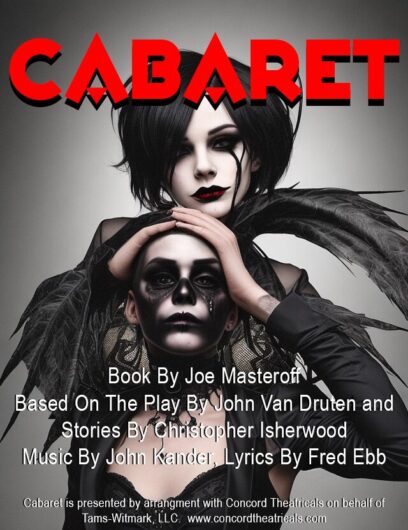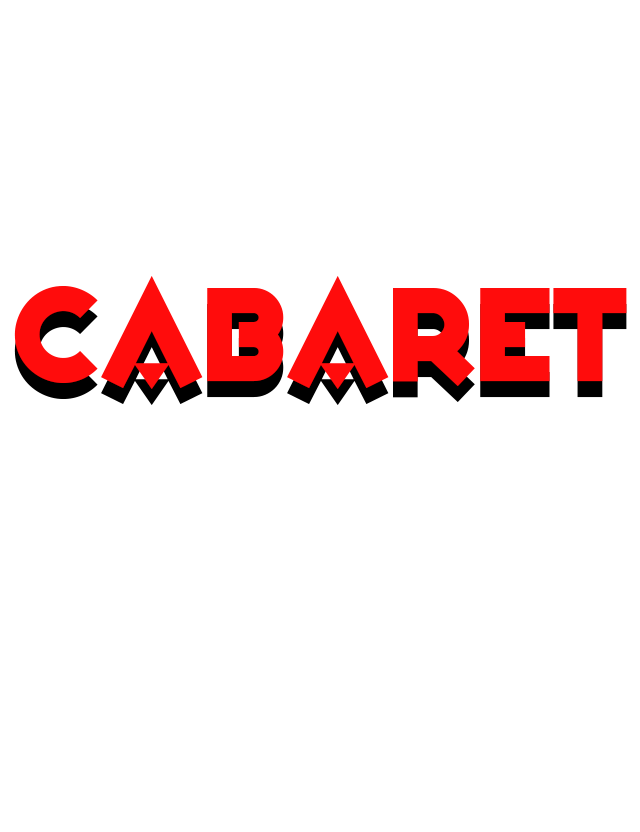Cabaret (1998)
Book By Joe Masteroff
Based On The Play By John Van Druten and
Stories By Christopher Isherwood
Music By John Kander, Lyrics By Fred Ebb
In a Berlin nightclub, as the 1920’s draw to a close, a garish Master of Ceremonies welcomes the audience and assures them they will forget all their troubles at the Cabaret. With the Emcee’s bawdy songs as wry commentary, Cabaret explores the dark, heady, and tumultuous life of Berlin’s natives and expatriates as Germany slowly yields to the emerging Third Reich. Cliff, a young American writer newly arrived in Berlin, is immediately taken with English singer Sally Bowles. Meanwhile, Fräulein Schneider, proprietor of Cliff and Sally’s boarding house, tentatively begins a romance with Herr Schultz, a mild-mannered fruit seller who happens to be Jewish. Musical numbers include “Willkommen,” “Cabaret,” “Don’t Tell Mama” and “Two Ladies.”
Cabaret is presented by arrangment with Concord Theatricals on behalf of Tams-Witmark, LLC. www.concordtheatricals.com

Come See Why Meyer2Meyer Entertainment’s Experiences Have Been Voted “The Best Attractions In The Country,” By PR Newswire And Forbes Magazine
Info At A Glance
Select Dates: June 14th – June 30th, 2024 (Closed)
Location: 324 North Orange Street, Glendale, CA 91203
Show Length: 2 Hours and 45 Minutes with Intermission
Thank you to everyone who joined us for Cabaret! Your support and enthusiasm made this production a tremendous success, and we couldn’t be more grateful for the energy you brought to each performance. While this show has now concluded its run, we are thrilled to have shared this unforgettable experience with you. Stay tuned for our upcoming productions, and we hope to see you back at The Nocturne Theatre soon!
Explore Cabaret The Musical - Songs, Quotes, FAQs, and More
Welcome to our comprehensive guide to Cabaret The Musical! Dive into the world of this iconic production, learn about its popular songs and quotes, explore its themes, and get answers to frequently asked questions about the show.
Cabaret The Musical’s Most Popular Songs:
- “Willkommen” – The Master of Ceremonies welcomes the audience to the Kit Kat Klub with the line “Willkommen, Bienvenue, welcome!”
- “Cabaret” – Sally Bowles sings about the allure of the cabaret life with the haunting line, “What good is sitting alone in your room? Come hear the music play!”
- “Maybe This Time” – Sally reflects on hope and longing with the line “Maybe this time, I’ll be lucky. Maybe this time, he’ll stay.”
- “Money, Money” – The Emcee and ensemble express the seductive power of money with the repeated chant “Money makes the world go round!”
- “Tomorrow Belongs to Me” – A seemingly innocent song sung by a young German boy takes on chilling undertones as it becomes a Nazi anthem.
- “Don’t Tell Mama” – Sally tries to keep her wild lifestyle a secret with the line “Don’t tell Mama, don’t tell Mama, whatever you do!”
- “Mein Herr” – Sally flirts and dances with the line “Mein Herr, und ich lieb’ dich nicht, und ich lieb’ dich nicht!”
- “Two Ladies” – The Emcee humorously navigates a love triangle with the line “Two ladies on the trapeze, deux dames in the air!”
- “If You Could See Her” – The Emcee challenges societal prejudices with the line “If you could see her through my eyes, she wouldn’t look Jewish at all.”
- “I Don’t Care Much” – The Emcee reflects on apathy and detachment with the line “I don’t care much, go or stay, I don’t care very much either way.”
Most Famous Quotes from Cabaret The Musical:
- “Life is a cabaret, old chum. Come to the Cabaret!” The Master of Ceremonies invites audiences to embrace the hedonistic world of the Cabaret, where they can forget their troubles and indulge in pleasure.
- “Money makes the world go round.” – This quote underscores the materialism and allure of wealth in a society on the brink of political and social upheaval.
- “What good is sitting alone in your room? Come hear the music play!” – Sally Bowles encourages living life to the fullest, embracing experiences, and seeking joy in the midst of uncertainty.
- “It’s just a jump to the left, and then a step to the right…” – A playful line from the song “The Time Warp,” featured in the Rocky Horror Show, not Cabaret.
- “The world keeps going round and round, but it doesn’t affect me.” – Reflects a sense of detachment and escapism prevalent in the characters as they try to ignore the looming reality of Nazi Germany.
Most Talked About Elements From Cabaret The Musical:
- Social Decadence vs. Political Unrest: Cabaret juxtaposes the vibrant, carefree atmosphere of the Kit Kat Klub with the rising tension of political extremism and anti-Semitism in 1930s Berlin.
- Compelling Characters: From the enigmatic Master of Ceremonies to the free-spirited Sally Bowles and the conflicted Clifford Bradshaw, the characters in Cabaret are complex and multifaceted, representing different facets of society and human nature.
- Exploration of Themes: The musical delves into themes such as love, ambition, identity, and the consequences of turning a blind eye to societal issues, making it a rich and thought-provoking theatrical experience.
- Theatrical Innovation: Cabaret seamlessly blends music, dance, drama, and political commentary, creating a dynamic and immersive theatrical experience that has captivated audiences for decades.
- Historical Context: Set against the backdrop of pre-WWII Germany, Cabaret offers a nuanced portrayal of a society on the brink of transformation, capturing the complexities of a tumultuous era.
Explore the captivating world of Cabaret The Musical with its iconic songs, memorable quotes, and thought-provoking themes. Whether you’re a musical theater fan or intrigued by historical dramas, Cabaret offers a compelling theatrical experience that lingers in the mind long after the curtain falls.
FAQs About Cabaret The Musical:
The musical is set in 1931 Berlin and follows the intertwined lives of a cabaret singer named Sally Bowles, an American writer named Clifford Bradshaw, and the Master of Ceremonies at the Kit Kat Klub. It delves into the nightlife of Berlin during the rise of the Nazi Party.
Cabaret contains mature themes and content, including sexuality, political upheaval, and violence. It may not be suitable for younger audiences.
The musical explores themes of decadence, escapism, and the consequences of ignoring political realities. It serves as a cautionary tale about the dangers of complacency in the face of societal unrest.
Yes, Cabaret is a renowned Broadway musical that has captivated audiences with its compelling storyline and memorable songs.
Cabaret’s popularity stems from its unique blend of music, provocative themes, and powerful performances that resonate with audiences and provoke thought.
The pineapple symbolizes hospitality and exoticism, reflecting the hedonistic and indulgent atmosphere of the Kit Kat Klub.
Yes, Cabaret contains risque content and explores themes of sexuality and decadence within the context of pre-WWII Berlin.
While Cabaret shares some elements with burlesque, such as cabaret-style performances and provocative themes, it is a distinct musical that delves into deeper social and political issues.
Absolutely! Cabaret offers a captivating theatrical experience with its compelling storyline, memorable music, and thought-provoking themes.
[Spoiler Alert] Sally Bowles’s fate varies depending on the production, but in most versions, she faces personal and emotional challenges, highlighting the consequences of her lifestyle choices.
Sally Bowles represents the Kit Kat Klub’s free-spirited, hedonistic lifestyle and symbolizes the era’s societal decadence and escapism.
The Cabaret movie differs from the musical in certain aspects, such as character development and plot details, to suit the medium of film and convey the story effectively.
The ending of Cabaret symbolizes the encroaching threat of Nazism and the character’s realization of the dark realities they face, marking a shift from hedonism to despair.
In some interpretations, Sally Bowles is portrayed as pregnant, adding complexity to her character and challenges.
While actual events inspire Cabaret and capture the atmosphere of pre-WWII Berlin, it also incorporates fictional elements for dramatic effect and storytelling purposes.
Cabaret The Musical is a captivating exploration of life, love, and societal upheaval set against the backdrop of 1930s Berlin. Through its iconic songs like ‘Willkommen’ and ‘Cabaret,’ memorable quotes such as ‘Life is a cabaret, old chum, come to the cabaret!’ and thought-provoking themes like the consequences of political apathy and the allure of escapism, Cabaret transcends mere entertainment to become a powerful commentary on human nature and historical realities. Its blend of theatrical innovation, compelling characters, and rich storytelling continues to captivate audiences, making it a timeless and unforgettable musical experience.
